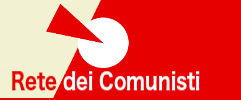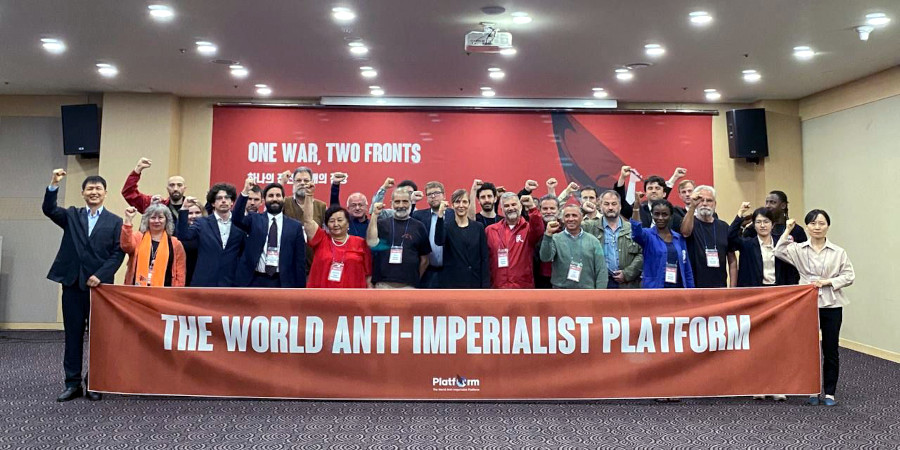| english | italiano |
Speech at the International Conference of the World Anti-Imperialist Platform in Seoul
On May 15th, the fourth meeting of the World Anti-Imperialist Platform was held in Seoul. Here, we made our contribution of analysis on the historical transition in which we are living and acting, on the tendencies and contradictions of the new historical phase discussed in the recent national forum “The Garden and the Jungle” and on the spaces that reality is reopening for the action of a communist and revolutionary subjectivity in the 21st century also within the European imperialist chain.
Rete dei Comunisti
Dear comrades, we would like to thank the People’s Democracy Party for organising this umpteenth meeting of the World Anti-Imperialist Platform and for the work done in recent months, together with the other communist political organisations, in promoting debate and mobilisation against imperialism and its barbarity.
This new appointment takes place in one of the outposts of Western imperialism in Asia, which with its brutality and violence has profoundly marked the political and social history of many countries in this hemisphere of the world. At the same time, it is precisely in these contexts that the peoples struggling against the imperialist opposition have been able to impose class advances and inspirational historical victories for revolutionary communists around the world.
The fight against the military presence of the USA and NATO, the numerous military bases and thousands of soldiers in South Korea, can only find us united and in solidarity against what is to all intents and purposes a common enemy. Italy is a victim of military servitude, with over a hundred US/NATO military bases – some secret and others housing nuclear bombs – that have always been operational in the context of wars and geo-political influence in our country.
The military escalation we are witnessing in Ukraine, in a war that Jens Stoltenberg himself has defined as a conflict between NATO and Russia, risks taking us further and further towards the abyss of global catastrophe. The sending of increasingly powerful and destructive weapons and the training of soldiers of the Ukrainian army demonstrate the co-participation of Western powers in this conflict that has been brewing since 2014. Merkel herself confessed that the Minsk agreements served to give Ukraine breathing space and strengthen it in order to relaunch the EU and NATO in the area. Recently, Josep Borrell, the EU foreign policy representative, declared that in Ukraine ‘it is not the time for diplomacy and peace, but for weapons’, reaffirming unconditional military support for the Kiev government and rejection of any peace proposal.
Today, China and Brazil – members of the BRICS – are among the main promoters at the international level of a concrete commitment to a diplomatic and peace resolution, demonstrating that there is a counterweight to the geo-strategic dynamics and interests of the Euro-Atlantic bloc. The clash that is becoming ever sharper in this new historical phase is that between ‘the garden and the jungle’, to borrow Borrell’s own racist and neo-colonial-sounding expression, which, however, fully embodies the difficulties and fears of the Western imperialist powers in maintaining a hegemonic role in the world.
The flight of the US and its allies from Afghanistan in August 2021 marked the end of an era. We have entered a phase in sharp discontinuity with previous ones, which objectively breaks with capitalist globalisation. The phase in which we are operating is that of the exhaustion of the global growth margins, as a whole, of the Capitalist Mode of Production, i.e. of the historical reduction of the rate of profit with respect to the enormous financial mass in circulation. This is what produces the “hyper-competitiveness” – as Ursula Avon del Leyden said – between capitalisms, which are the product of specific histories and interests.
This process that determines two main world ‘blocs’, in contradiction and conflict with each other about a different vision of the world order and international relations, has only just begun in an obvious way and will continue, in a non-linear manner, in the coming years. If the Euro-Atlantic bloc is more homogeneous politically and ideologically as it is in continuity with colonialism and historically hegemonic imperialism, we see an alternative area that is more variegated, first and foremost in its political character as it is built on economic and trade relations, but which manifests a common interest in cooperative integration and de-dollarisation, with countries that call themselves outside imperialist hegemony (Cuba, Venezuela, Nicaragua, Cina, etc.), and defend the right to the self-determination of peoples.
As Gramsci stated almost a hundred years ago, ‘the crisis consists precisely in the fact that the old is dying and the new cannot be born: in this interregnum a great variety of morbid symptoms appear’. If, on the one hand, the trend towards war represents the only attempt to overcome the structural crisis of the Capitalist Mode of Production, on the other hand, the basic conditions are being created for a multipolar – and possibly ‘multilateral’, as Comandante Hugo Chávez Frías said – system at the trade, monetary and political level, diametrically opposed to the military and monetary domination of imperialism.
After decades of the hegemony of advanced capitalist countries, the entry into the field of emerging economies belonging to the ‘enlarged’ BRICS area and the contextual and repeated economic, pandemic, and environmental crises have produced tensions, clashes, and conflicts that have led to a breakdown of the previous world order. The ongoing war, incubated for years in asymmetrical wars and sanctions waged by Western imperialisms – by the US above all – has reappeared as a possible rupture of an equilibrium based on US hegemony and unilateralism. The need to break with the hegemony of the dollar in world transactions and to escape the interference of the Western powers has seen a growing push to question international relations, towards a multipolar world.
Communists must be able to understand the tendential and contradictory trend of historical processes to give strength, direction and depth to political, social, trade union and ideological action within the ongoing class conflict, at the national and international level. This requires an effort of theoretical analysis that is not limited to ‘photographing the present’, but which aims to understand the contradictions and aspects of the historical transition we are experiencing and in which we are called to act. Against the militarisation of society and the war-mongering ideology, on the one hand, and the social massacre imposed from above on the working classes, on the other, it is the task of the communists to strengthen the organisational structures to stop internal and external war.
Withdraw of all US/NATO military bases! Out of NATO now!
War on imperialist war! Peace and revolution for all peoples of the world!
Seoul, May 15th, 2023

